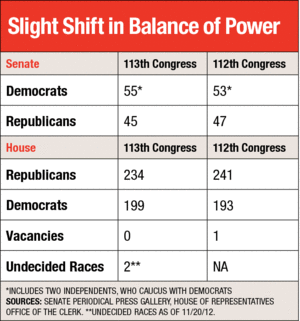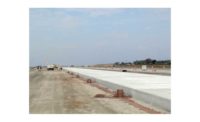
The fierce and expensive federal election campaigns produced no major power shifts: President Obama was re-elected; Democrats added two seats to their Senate majority; and Republicans held the House, though they lost seven seats.
Leaving aside blue-state, red-state maps, construction officials are focusing on pressing legislative and regulatory issues. Avoiding the "fiscal cliff" is the immediate matter. Obama and Capitol Hill leaders began talks on Nov. 16 to decide the fate of billions of dollars in tax breaks that expire on Dec. 31 and mandatory spending cuts that kick in on Jan. 2 (see p. 29).
Whatever the outcome of the negotiations, it will affect construction firms' bottom lines and willingness to hire. It also will set the stage for how the White House and the 113th Congress deal with key construction legislation, including appropriations for the last half of fiscal 2013 and possible water-resources and immigration bills. Transportation is a perennial construction priority. The Moving Ahead for Progress in the 21st Century Act (MAP-21) doesn't expire until 2014, but industry groups hope Congress will find new revenue before then to keep the Highway Trust Fund in the black past MAP-21.
Many also are awaiting Obama's decision on a revised application to build the Keystone XL pipeline to carry oil from Canada's tar sands through the U.S. Midwest. He rejected an earlier plan in January.
Two groups that helped propel Obama to victory are on opposite sides of the issue. Construction unions are pushing to see the pipeline approved. Sean McGarvey, AFL-CIO Building and Construction Trades Dept. president, said on Nov. 15 that for the many union members who voted for Obama in critical states and "knocked on doors, made phone calls and provided the crucial on-the-ground support that enabled him to return to office, the calculus of this issue is straightforward and simple. They voted for President Obama because they believed in his commitment to job creation."
Environmental groups want to block the project. Susan Casey-Lefkowitz, director of the Natural Resources Defense Council's international program, says, "Tar-sands oil is such a dirtier form of oil than even the conventional oil that it's not something that we think we should be putting our lands at risk for."




Post a comment to this article
Report Abusive Comment